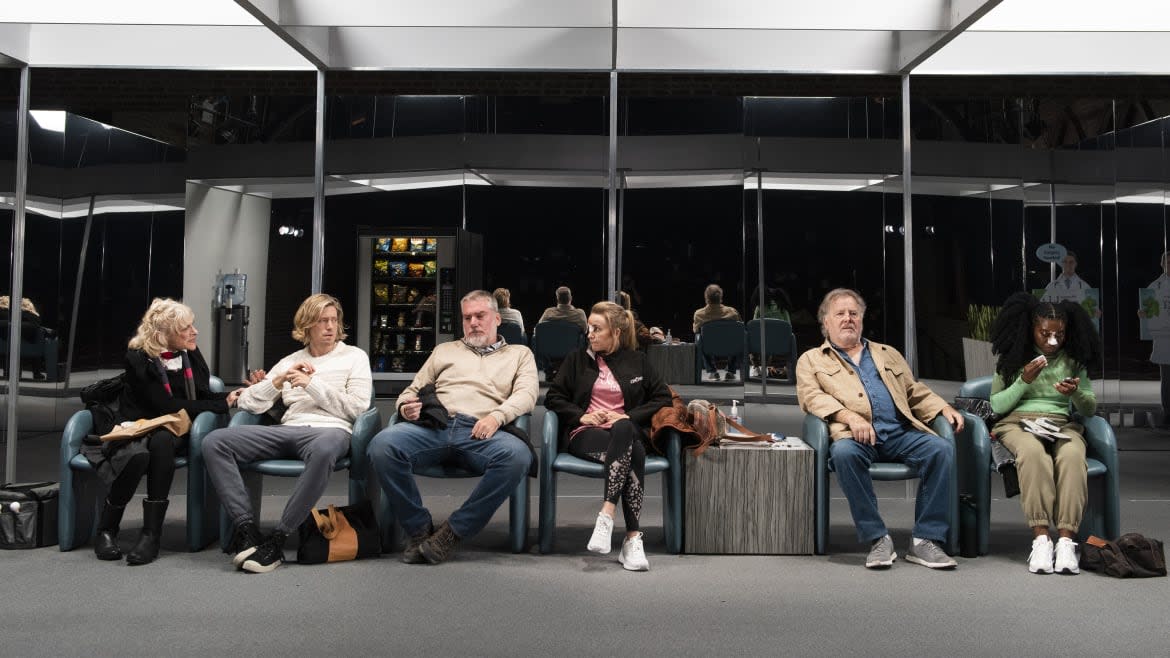‘I’m Revolting’ Puts Confronting Skin Cancer Under a Sharp Microscope

In the play I’m Revolting (Atlantic Theater Company, to Oct. 16) it is just another day in a New York skin cancer clinic, some time in December 2019. It isn’t the leading skin cancer clinic, we are told—which immediately tells us something that is already known all too well by the patients we are about to meet. We meet a senior doctor, Denise (Patrice Johnson Chevannes), and her junior Jonathan (Bartley Booz), as they prepare for a day of inpatients by briefly scanning their nameless treatment biographies.
Jonathan wordlessly erects a cardboard mannequin sent in by some medical reps—with a smiling figure advertising a new medication. “No surgery needed” is the bright promise this medication offers.
Maddow Says She’ll ‘Be Totally Fine’ After Revealing Skin Cancer Diagnosis
For the 90 minutes of Gracie Gardner’s affecting gem of a play, directed by Knud Adams, the advertisement is proven a graphic lie: We see patients facing the prospect of surgery, questioning diagnoses and treatment plans, or undergoing surgery and experiencing its physical and psychological aftermaths. The double-meaning title of the play refers to how some of the characters may (partly) feel about themselves, and also how they are facing what they are going through—and the medical care they are being offered in this, a place they know not to be the best but the only port of call they can afford or access.
Marsha Ginsberg’s set is a waiting room, a row of chairs facing the audience, mirrors behind reflecting the audience’s faces. Kate McGee’s lighting is of the appositely utilitarian kind, which darkens as the day goes on.
What this disease means, its impact, and days like this when everything might change and nothing will, are brought to vivid stage life. Reggie (a brilliantly natural performance by Alicia Pilgrim) is facing the prospect of a surgery that will affect her face. She is young, gay, and terrified of what scarring or changes to her physical appearance will be. Will she do what the doctors want her to do, or will she find the voice and power to insist on what feels right for her?
Fortunately, although it doesn’t seem so fortunate at the beginning, she has the advocacy of sister Anna (Gabby Beans, Tony-nominated earlier this year for The Skin of Our Teeth). Beans relishes every whipcrack line she is given; Anna works in the finance industry, is wired up to receive very urgent telephone calls, and is rather too pressed for time to support her sister on this trying and traumatic day.
Liane (Emily Cass McDonnell) is mid- a bunch of surgeries, with no end in sight, and while she is supported by her husband, Jordan (Glenn Fitzgerald), we soon see how much of a partner on the edge he is. Can their relationship survive the day?
The handsome former lifeguard Toby (Patrick Vaill) spends his first minutes in the waiting room buried under his coat, unable to bear the prattle and confessionals around him. He wants to make clear that he doesn’t yet have a cancer diagnosis. Then his mother, Paula (Laura Esterman), arrives with sound bowls and talk of how the warped spirit inside us makes us ill.
This, inevitably, does not go down well with a group of people with a disease they do not see in such terms and who have given themselves over to scientific expertise to fight. Peter Gerety’s Clyde, who’s been there and seen it all, supports the other patients and castigates Paula for the insensitive hogwash he sees her as peddling.
Gardner, Adams, and all the performers capture the ebb and flow of gallows humor, trauma, mundanity, and pivotal decision-making of the day with precision. In its focus on a group of people who are on varying edges and turning points, it reminded this critic—in structure and composition—of the Atlantic’s last much-deserved success, English. They are not the same play thematically, but both are beautifully written and directed character studies—both singular and collective.
Sometimes I’m Revolting feels too delicate (and some of the actors need to speak up, or their microphone levels need bringing up), but its reticence also feels very real as patients and their loved ones face these eddying moments of crisis and change. Our audience was rapt as the patients resisted and accepted what was happening to them, and Denise and Jonathan’s ministrations. Floppy-haired Jonathan seems a figure of fun—Doogie Howser, Anna dismissively calls him—until he is very much not.
The quiet power of the play—and that we see unfold in the waiting room’s glancing encounters and occasional confrontations—is highlighted near the end, when one character notes that she cannot leave another. Why? she is asked. They are not friends. But for today, this day we are privy to, they are bound together, and no matter how delicate and temporary that bond, it is one this character respects.
The end of the play contains a final twist and depth charge—returning the focus to the two doctors. For the duration of the play, they have tried to encourage the patients to have the treatments they recommend. We have seen every kind of response to them. We have seen them be blunt and sensitive. We know this isn’t the best clinic in town. We also know Denise and Jonathan seem to want to do their best for their patients. But that, it turns out for one of them, is far from good enough, appallingly so.
What the end of I’m Revolting also makes clear—with its sharp, mordant wit—is that the business of life and death in clinics like this will also go on, for better and worse.
Get the Daily Beast's biggest scoops and scandals delivered right to your inbox. Sign up now.
Stay informed and gain unlimited access to the Daily Beast's unmatched reporting. Subscribe now.

 Yahoo Movies
Yahoo Movies 
